This was a solid pop science book on how diseases spread, and what we’re doing 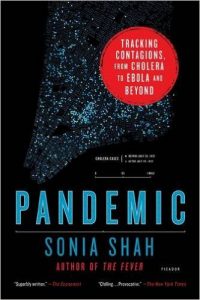 (or not doing!) to stop them. The book is structured according to human behaviors vis-a-vis diseases, and also uses cholera as a particular case of a disease with which to weave together the general complexity of epidemiology. I found the overall book a bit disjointed, though many individual parts were quite enjoyable. That said, overall I would’ve liked a bit more depth, especially in the sections concerned with policy.
(or not doing!) to stop them. The book is structured according to human behaviors vis-a-vis diseases, and also uses cholera as a particular case of a disease with which to weave together the general complexity of epidemiology. I found the overall book a bit disjointed, though many individual parts were quite enjoyable. That said, overall I would’ve liked a bit more depth, especially in the sections concerned with policy.
Category: Science
The Pope of Physics
On the one hand, I enjoyed this book. On the other, for such an important and 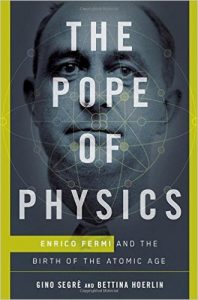 fascinating character as Fermi, I couldn’t help but think this book was a bit of small beer. I would’ve happily enjoyed a book three times its length. Relatedly, I would’ve liked fewer asides about the general aspects of the Manhattan Project. Perhaps there’s no good way to get all the info now, but I would’ve loved to get a stronger feel for all those deathbed conversations with great and controversial thinkers.
fascinating character as Fermi, I couldn’t help but think this book was a bit of small beer. I would’ve happily enjoyed a book three times its length. Relatedly, I would’ve liked fewer asides about the general aspects of the Manhattan Project. Perhaps there’s no good way to get all the info now, but I would’ve loved to get a stronger feel for all those deathbed conversations with great and controversial thinkers.
I don’t want to say it’s a bad book – in fact it might be the best Fermi biography available. It also has the incidental point of interest that one of the authors is the nephew of Emilio Segrè, which may explain why the sections about Fermi’s friends were some of the best and most detailed of the book. If you, like me, enjoy biographies from the Heroic Age of Physics, it’s definitely worth a read.
Chaos Monkeys
Read this one. I don’t know if I love it or hate it or both, but Martinez is a delight. 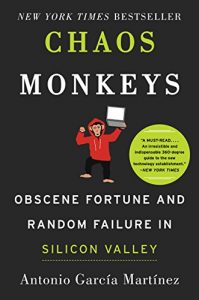 By his own admission, he’s somewhat playing a character as he recounts his days in the Silicon Valley startup seen, and later at Facebook. This is a sort of tell-all book of gossip, but it’s made enjoyable by the fact that Martinez is (openly) attempting to be Michael Lewis. The writing is quite good, and Martinez makes a point of showing off his liberal arts education, in a way that almost reminded me of Nabokov.
By his own admission, he’s somewhat playing a character as he recounts his days in the Silicon Valley startup seen, and later at Facebook. This is a sort of tell-all book of gossip, but it’s made enjoyable by the fact that Martinez is (openly) attempting to be Michael Lewis. The writing is quite good, and Martinez makes a point of showing off his liberal arts education, in a way that almost reminded me of Nabokov.
It’s a strange book, and will leave you feeling a bit slime-coated at times, but I can’t help but think in 50 years, when the Golden Age of Silicon Valley is being recounted in college classrooms, a playful professor will enjoy assigning this book as a more true portrayal than that in history books.
Standard Deviations
Gary Smith is my kind of curmudgeon. This book is basically a long set of essays on how people screw up their stats. Sometimes this is particular complaints about particular (often famous) scholars. Sometimes it’s discussion of common 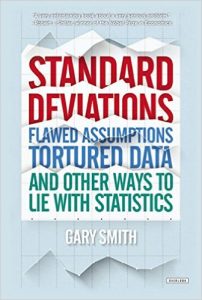 conceptual errors. I especially enjoy how pretty much nobody is spared, from politicians to famous scholars, to beloved intellectuals like Steve Levitt of “Freakonomics” fame.
conceptual errors. I especially enjoy how pretty much nobody is spared, from politicians to famous scholars, to beloved intellectuals like Steve Levitt of “Freakonomics” fame.
If you’re into turning a skeptical eye on everything, or if you want to learn how to think more clearly about science, the news, politics, economics, and anywhere else people are likely to abuse stats, this is a a great book for you.
The Botany of Desire: A Plant’s-Eye View of the World
I have a love-hate relationship with Pollan. He writes well, but for popular 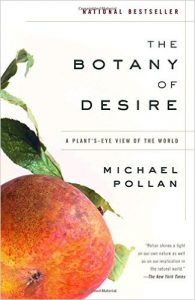 science I often find it a bit lighter on science than I’d like. As with many writers who fall somewhere between journalism and pop science, you often get a long story about visiting a person and place instead of a detailed description of the science at hand.
science I often find it a bit lighter on science than I’d like. As with many writers who fall somewhere between journalism and pop science, you often get a long story about visiting a person and place instead of a detailed description of the science at hand.
Then again, I have never failed to enjoy one of his books. This one is about plants that have so deeply satisfied human desires (marijuana, apples, potatoes, and tulips) that humans have cultivated them extensively. The conceit here is that the plants have tapped our desire as a means of reproduction. This isn’t a new idea, and I suspect it wasn’t new in 2001, but it is very well explored. And, like all Pollan’s books, it has an engaging structure as it moves from topic to topic – tulips are beauty, apples are sweetness, potatoes are control, and marijuana is intoxication.
In short, I enjoyed it, and to the extent I have criticisms, they are basically unfair. I would prefer more depth in a book that is supposed to read more like an adventure travelogue of food. If that sounds like something you’d like, I recommend it.
Venomous
What a great little book on everything to do with venom. Wilcox relates a lot of  fascinating biology along with a lot of the weird anecdotes you might imagine a biologist who studies venom might have.
fascinating biology along with a lot of the weird anecdotes you might imagine a biologist who studies venom might have.
Computing: A Concise History
This book is basically what the title claims. I was actually hoping for something a  bit more technical, but this book really is concise and focused mostly on basic historical facts. If you don’t know anything about the history of computing, this is a great place to start. If you already know the basic deal, I’d skip it.
bit more technical, but this book really is concise and focused mostly on basic historical facts. If you don’t know anything about the history of computing, this is a great place to start. If you already know the basic deal, I’d skip it.
Uncharted
Caveat: I have met and like one of the authors, so I am biased.
I enjoyed this book, though I worry time will treat it poorly, as it has already been 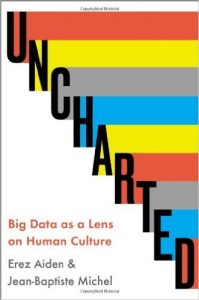 victimized by the authors’ success. This book is basically a description of how the authors (and others) created google ngrams. It’s not just technical stuff either – it’s a lot of their philosophy of what they find interesting.
victimized by the authors’ success. This book is basically a description of how the authors (and others) created google ngrams. It’s not just technical stuff either – it’s a lot of their philosophy of what they find interesting.
The problem is that a lot of the book consists of interesting patterns and correlation they found using ngrams. The correlations are neat, but given how popular ngrams has gotten (and especially its spike in popularity a few years ago, the examples don’t feel as exciting as they must’ve when the book first came out. This isn’t exactly a knock against the book, but it does make some large sections of it less interesting than they might’ve been.
My Best Mathematical and Logic Puzzles (Dover Recreational Math)
I finally got myself into Martin Gardner, and I enjoyed myself thoroughly. My 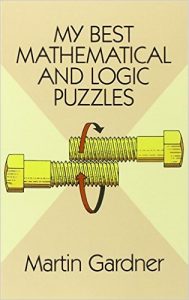 only complaint (and, it’s a bullshit complaint) is that I really prefer a particular type of puzzle – the kind that is simple enough to easily hold in one’s head, and which doesn’t benefit from having pencil and paper. Some of the puzzles had interesting results, but really just required you to sit and write out a little algebra.
only complaint (and, it’s a bullshit complaint) is that I really prefer a particular type of puzzle – the kind that is simple enough to easily hold in one’s head, and which doesn’t benefit from having pencil and paper. Some of the puzzles had interesting results, but really just required you to sit and write out a little algebra.
Wonderland: How Play Made the Modern World
This book was a bit light, but still very enjoyable. The thesis is that play and 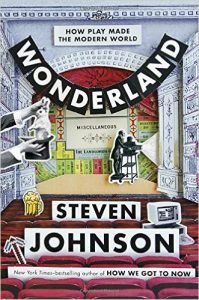 pleasure very important to the history of science, technology, and culture. As an example, Johnson argues that interest in automata helped lead (if a little indirectly) to the development of computers. Apparently, Babbage was quite interested in these early robots as a child, and it probably influenced his work. Johnson discusses other topics, such as the spice trade and the development of the Jacquard loom.
pleasure very important to the history of science, technology, and culture. As an example, Johnson argues that interest in automata helped lead (if a little indirectly) to the development of computers. Apparently, Babbage was quite interested in these early robots as a child, and it probably influenced his work. Johnson discusses other topics, such as the spice trade and the development of the Jacquard loom.
I found this book fun, though I’m not quite prepared to buy the thesis as such. After all, anything that reaches fruition as a technology must first have been imagined. It’s hard to think of any interesting contraption whose origins couldn’t be traced back to something fun, in part (I suspect) because fun things tend to be easier to make. It’s hard to think of space-rockets coming into existence without someone first making toy versions. Furthermore, people play with all sorts of stuff that, of course, does NOT lead to technological revolutions.
